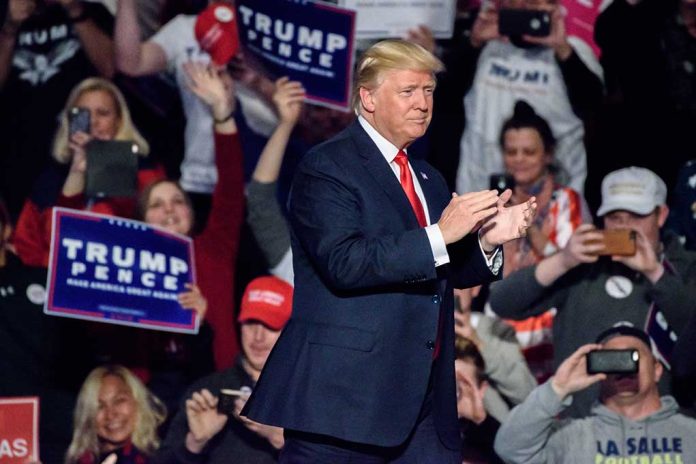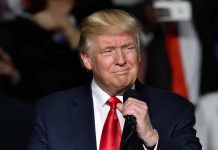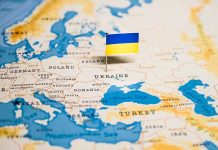
Trump’s audacious proposal to make Canada the 51st state comes with a jaw-dropping 60% tax cut for Canadians, but is it just another grandiose jest from the former president?
At a Glance
- Trump suggests Canada could become the 51st state, offering a 60% tax reduction
- Proposal includes territorial expansion into Greenland and Panama
- Canadian leadership dismisses the idea as a joke, not a serious diplomatic move
- Trump criticizes Canada’s border security and trade deficit with the U.S.
- Canadians and officials react with skepticism and humor to the suggestion
Trump’s Ambitious Vision: Canada as the 51st State
In a move that has left many scratching their heads, former President Donald Trump has floated an extraordinary proposal to incorporate Canada as the 51st state of the United States. This audacious plan, which Trump claims would benefit Canadians through significant tax reductions, has sparked a whirlwind of controversy and skepticism. The former president’s vision extends beyond just Canada, hinting at possible territorial annexations in Greenland and Panama, rekindling past ambitions and raising eyebrows across the international community.
Trump’s proposal came to light during a meeting with Canadian Prime Minister Justin Trudeau, where discussions centered on tariffs, border security, and trade deficits. The conversation took an unexpected turn when Trump, in response to Trudeau’s concerns about potential devastating effects of tariffs on the Canadian economy, jokingly suggested Canada could become the 51st state. This comment was met with nervous laughter, setting the tone for what would become a broader, albeit questionable, vision of territorial expansion.
Trump: Canada becoming 51st state 'great idea' https://t.co/3fVVRUiFV1
— KSN News Wichita (@KSNNews) December 18, 2024
The 60% Tax Cut: A Sweet Deal or Empty Promise?
At the heart of Trump’s proposal is a tantalizing offer: a 60% tax reduction for Canadians willing to join the union. This dramatic cut, Trump argues, would see Canadian businesses “immediately double in size” and provide unparalleled military protection. While the offer might sound appealing on the surface, it’s important to note the lack of detail or feasibility studies supporting these claims. The proposal seems more like a political attention-grabber than a well-thought-out economic strategy.
“Also, to Governor Justin Trudeau of Canada, whose Citizens’ Taxes are far too high, but if Canada was to become our 51st State, their Taxes would be cut by more than 60%, their businesses would immediately double in size, and they would be militarily protected like no other Country anywhere in the World.” – Donald Trump
Trump’s characterization of Trudeau as “Governor” and his claim that Canadians want to become the 51st U.S. state further underscore the provocative nature of his statements. These remarks, coupled with an AI-generated image of Trump with a Canadian flag, seem designed to stir controversy and maintain media attention rather than present a serious diplomatic proposal.
Beyond Canada: Greenland and Panama in Trump’s Crosshairs
Trump’s territorial ambitions don’t stop at the Canadian border. He’s rekindled interest in acquiring Greenland, a proposal previously rejected by Denmark, citing national security concerns. Additionally, Trump has criticized Panama’s control over the Panama Canal, suggesting U.S. intervention to address rising shipping costs. These statements have been met with firm resistance from the respective countries, highlighting the impracticality and potential diplomatic fallout of such proposals.
“For purposes of National Security and Freedom throughout the World, the United States of America feels that the ownership and control of Greenland is an absolute necessity.” – Donald Trump
While Trump’s ideas might seem far-fetched, they reflect a broader pattern of his approach to international relations and territorial interests. His focus on national security and economic advantages, however misguided, resonates with a portion of his base who view American expansion and control as synonymous with strength and prosperity.
Do you support Canada becoming the 51st State? https://t.co/hBIcm9EuE6
— TheÐogeGlory (@GloryDoge) December 26, 2024
Canadian Response: Dismissal and Diplomacy
Canadian officials, including Prime Minister Justin Trudeau and Public Safety Minister Dominic LeBlanc, have wisely chosen to treat Trump’s comments as jest rather than serious diplomatic overtures. This approach allows them to maintain cordial relations while firmly rejecting the notion of Canadian annexation. Trudeau’s focus on highlighting the differences between the northern and southern U.S. borders and emphasizing Canada’s role as a major supplier of energy and critical resources to the U.S. demonstrates a more pragmatic approach to bilateral relations.
As absurd as Trump’s proposal may seem, it serves as a reminder of the complex and often unpredictable nature of international relations in the modern era. While the idea of Canada becoming the 51st state remains firmly in the realm of political fantasy, the discussion it has generated highlights the ongoing challenges in U.S.-Canada relations, particularly regarding trade, border security, and economic cooperation. As we move forward, it’s crucial to focus on practical, mutually beneficial solutions rather than grandiose, unrealistic proposals that serve more as political theater than serious policy.
Sources:
- Donald Trump makes astonishing offer to people of Canada in strongest bid yet to ‘take over’
- Trump: Canada becoming 51st state ‘great idea’
- Trump suggests Canada become 51st state after Trudeau said tariff would kill economy: sources
- Canadian minister says Trump was joking when he said Canada could become the 51st state

















